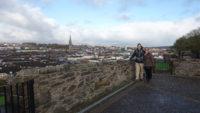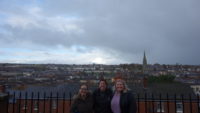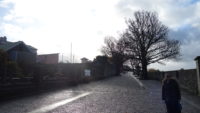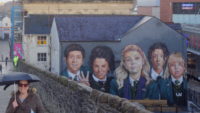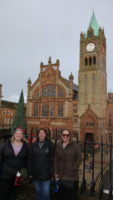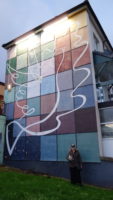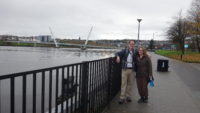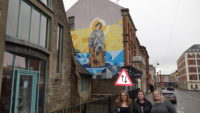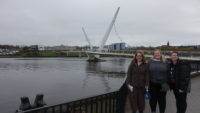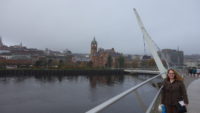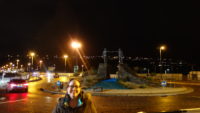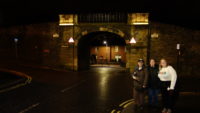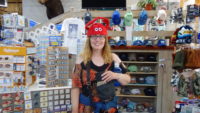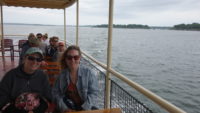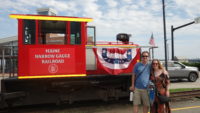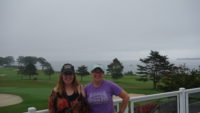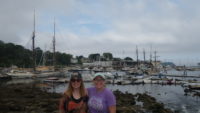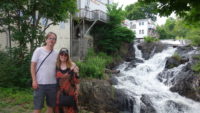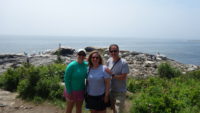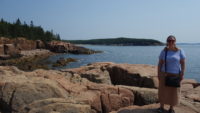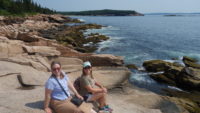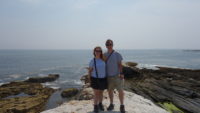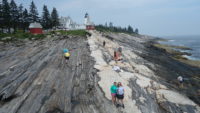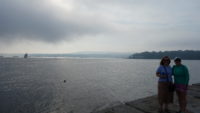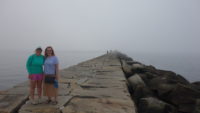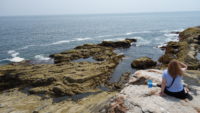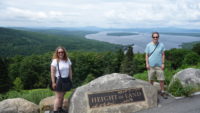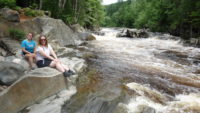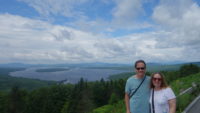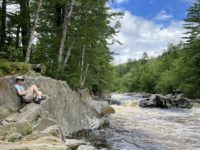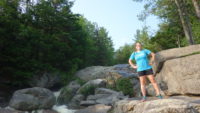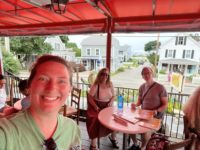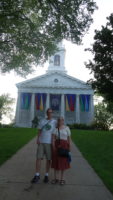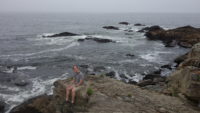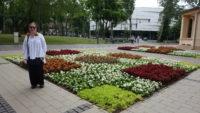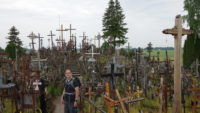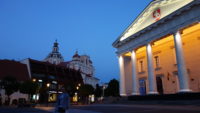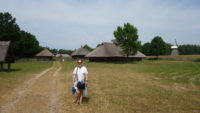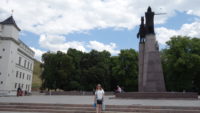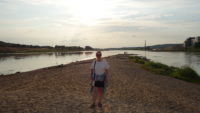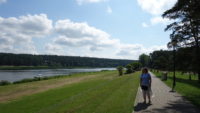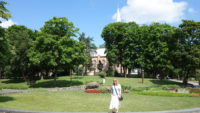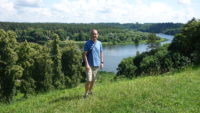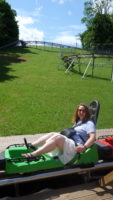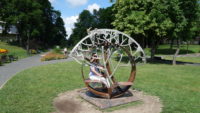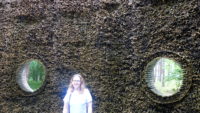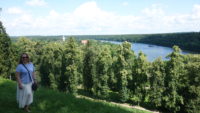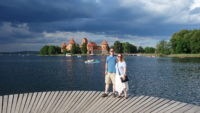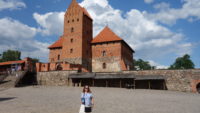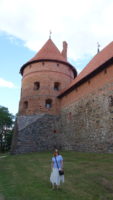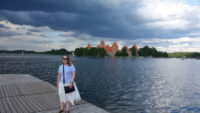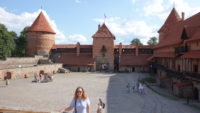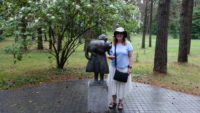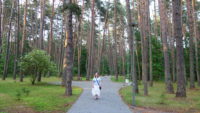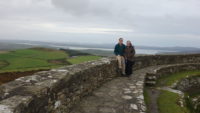 Today I made the bold decision to go “OR” — Off Rick. Mer is fond of Rick Steves guidebooks, and they have stood us in good stead, but every once in a while, I want to go somewhere Rick doesn’t go. A local man strongly recommended the Inishowen Peninsula, which is what is north of Derry. I had been eyeing that trip anyway, and we had never been there before, so with a local’s endorsement, I decided to spend the day exploring there. We managed to get to about half of what I wanted to do. Next time.
Today I made the bold decision to go “OR” — Off Rick. Mer is fond of Rick Steves guidebooks, and they have stood us in good stead, but every once in a while, I want to go somewhere Rick doesn’t go. A local man strongly recommended the Inishowen Peninsula, which is what is north of Derry. I had been eyeing that trip anyway, and we had never been there before, so with a local’s endorsement, I decided to spend the day exploring there. We managed to get to about half of what I wanted to do. Next time.
We managed to get out of town and into the country (and to actual Ireland) pretty quickly with the help of the GPS. It sent me down increasingly small roads until it told me to turn into someone’s field, which was clearly wrong. I swapped over to my travel phone instead, and that got us where we were going – the reconstructed ring fort Grianan of Aileach. The fort is situated on top of a hill overlooking multiple mountains, a river, an island, and a lough, so we were already impressed just from the parking lot. The original ring fort was constructed around 600 or so, but legend has it that it was mostly destroyed around 1100. The fort was rebuilt in the mid-1800s by a well-meaning archeologist, but the method would probably appall most scientists today, who seem to favor preservation of ruined sites. At any rate, as a tourist, I appreciated the ring fort, as it was where I could climb the walls and look all about. It may be less pure, but is more functional than a thousand-year-old pile of rocks.
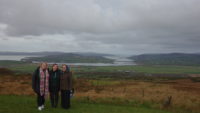 We took a ton of pictures and enjoyed the views. We lingered for some time up there and walked all around the fort, both inside and out. We then headed north to our next destination, the town of Buncrana. The town is right on Lough Swilly, with a pretty beach and paved walking trails along the water. The lough has many small mountains spilling down into it, so it was also a pretty place to be. We walked north for three quarters of a mile so I could see a stone bridge, and along the way, we discovered were were on the “Amazing Grace Trail” — a walking trail with signs that told the story of John Newton, the former slave trader who wrote “Amazing Grace” and fought to end slavery in England. I got treated to the hymn in three-part harmony from my traveling companions.
We took a ton of pictures and enjoyed the views. We lingered for some time up there and walked all around the fort, both inside and out. We then headed north to our next destination, the town of Buncrana. The town is right on Lough Swilly, with a pretty beach and paved walking trails along the water. The lough has many small mountains spilling down into it, so it was also a pretty place to be. We walked north for three quarters of a mile so I could see a stone bridge, and along the way, we discovered were were on the “Amazing Grace Trail” — a walking trail with signs that told the story of John Newton, the former slave trader who wrote “Amazing Grace” and fought to end slavery in England. I got treated to the hymn in three-part harmony from my traveling companions.
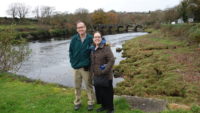 As we approached the bridge, we stopped next to a parking lot to take pictures, and a woman got out of her car to come over to us. She recognized us from the small church we attended on Sunday, and we were in the same parking lot in the same lightly populated northern part of Donegal at the same time. That was amusing. She recommended we go over the bridge and walk along the lough some more, which we did. The views of the sun off the water were especially good, but we only went less than a mile along the trail, since it seemed to go on for some ways.
As we approached the bridge, we stopped next to a parking lot to take pictures, and a woman got out of her car to come over to us. She recognized us from the small church we attended on Sunday, and we were in the same parking lot in the same lightly populated northern part of Donegal at the same time. That was amusing. She recommended we go over the bridge and walk along the lough some more, which we did. The views of the sun off the water were especially good, but we only went less than a mile along the trail, since it seemed to go on for some ways.
That left a hefty walk back to the car, so we stopped at a snack shop in the parking area to use the bathroom and grab some candy bars. The woman at the till continued our experience of meeting gregarious Irish folk who were very kind to us and loved chatting. Fortified with sugar, we found our way back to the car to head up to our next sight, which had been recommended by our saleswoman — Fort Dunree.
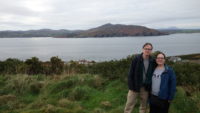 Fort Dunree is a fort built in the late 1700s by the English to protect the harbor against the French. It was an active fort for the British through World War I and even into the 1930s as part of the agreement that created the Republic of Ireland, but in the 1930s, the fort was handed over to the Irish, who staffed it during World War II to keep the fighting nations from messing around with neutral Ireland’s waterways. Sometime after that, the fort was decommissioned, and the small army town of wood and aluminum huts around the fort have fallen into disrepair, and multiple signs warned us that we wandered the area at our own risk.
Fort Dunree is a fort built in the late 1700s by the English to protect the harbor against the French. It was an active fort for the British through World War I and even into the 1930s as part of the agreement that created the Republic of Ireland, but in the 1930s, the fort was handed over to the Irish, who staffed it during World War II to keep the fighting nations from messing around with neutral Ireland’s waterways. Sometime after that, the fort was decommissioned, and the small army town of wood and aluminum huts around the fort have fallen into disrepair, and multiple signs warned us that we wandered the area at our own risk.
The lower fort is still intact as a museum, but as it was late, we skipped it. Meredith, Julia, and I walked down to some lower pill boxes for the views while Sydney contented herself with viewing the pretty from a bench by the fort. After we looked around, I wandered up a path into the old army town area, and saw the upper fort higher up on the hill. Julia asked if that’s where we were headed, and I nodded, of course. Meredith and Julia are game souls.
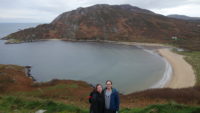 The upper fort was worth the climb. We not only got great views of the mountains on the opposite shore of the fort, but we also got to see a long crescent beach towered over by a rocky mountain that was on the far side of the fort hill and couldn’t be seen from below. We stood up there to listen to the silence, broken only by the distant sound of the waves crashing on the beach below.
The upper fort was worth the climb. We not only got great views of the mountains on the opposite shore of the fort, but we also got to see a long crescent beach towered over by a rocky mountain that was on the far side of the fort hill and couldn’t be seen from below. We stood up there to listen to the silence, broken only by the distant sound of the waves crashing on the beach below.
Back down to the car and on to our next sight, which was more of an experience. I wanted to drive over the Gap of Mamore, which isn’t towering, at eight hundred feet tall, but is very dramatic as you go down the north side of the gap. We stopped at a pull-off near the top and spent a decent amount of time there looking at the sea and small town below and the mountains all around. And the sheep. There are always sheep. We stopped again part way down for different views.
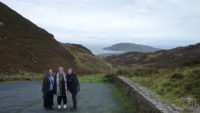 By now, we were running out of daylight. One of the downsides of traveling in Ireland in November is that it gets quite dark by about 4:30. I programmed the GPS to take us thirty minutes away to a circle of ancient standing stones. We almost made it. My phone GPS had us walking into someone’s back yard and field, so I knocked at the door to ask about the stones. A very pleasant lady answered and told us where it was, and invited us back to her gallery when we were done. I wasn’t fully sure of her directions, and the light was really failing, so we stuck around to see her art.
By now, we were running out of daylight. One of the downsides of traveling in Ireland in November is that it gets quite dark by about 4:30. I programmed the GPS to take us thirty minutes away to a circle of ancient standing stones. We almost made it. My phone GPS had us walking into someone’s back yard and field, so I knocked at the door to ask about the stones. A very pleasant lady answered and told us where it was, and invited us back to her gallery when we were done. I wasn’t fully sure of her directions, and the light was really failing, so we stuck around to see her art.
Mary works with bog wood. That is wood dug out of peat bogs when someone digs up turf to burn. Bog wood can take up to five years to dry, but then Mary carves it based on shapes that were suggested by the wood. The results are fairly abstract in most cases, but she had some representative pieces as well. We liked her work and bought a small necklace to use as a Christmas tree ornament.
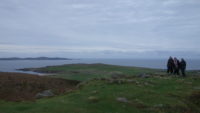 That ended the Inishowen Peninsula tour, and a thirty-minute (occasionally tense) drive brought us back to Derry, where we got supper. We went back home, and after a short break, Mer and I went to a local pub to see if they had music tonight. They did — a solo singer who played guitar. Julia and Sydney decided to stay cozy at the B and B, but Mer and I stayed at the pub for about an hour. We were very pleased to have gotten to some live music.
That ended the Inishowen Peninsula tour, and a thirty-minute (occasionally tense) drive brought us back to Derry, where we got supper. We went back home, and after a short break, Mer and I went to a local pub to see if they had music tonight. They did — a solo singer who played guitar. Julia and Sydney decided to stay cozy at the B and B, but Mer and I stayed at the pub for about an hour. We were very pleased to have gotten to some live music.
Tomorrow will be mostly Rick-led as we explore the scenic Antrim coast. We’ve continued to have mostly rain-free weather, which opens up the outdoor options nicely. Here’s hoping for more beauty as we putter around the island.
